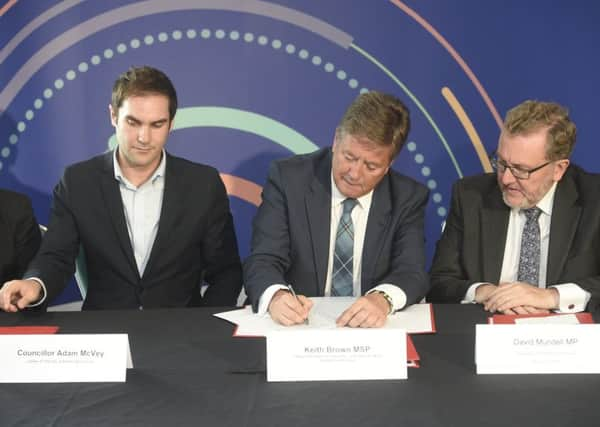Edinburgh's City Deal set to be questioned by MSPs


The Scottish Parliament’s local government committee has conducted an inquiry into the deals, including concerns about how the benefits are shared out within each region and criticism of how the process works.
Edinburgh’s city region deal, announced in July, covers the Capital, East Lothian, Midlothian, West Lothian, Fife and Borders. But the committee heard claims that Fife had got little out of the package.
Advertisement
Hide AdAdvertisement
Hide AdAnd there were also complaints that despite more than two years of talks the final agreement had been rushed, leaving too little time for scrutiny.
The MSPs are understood still to be finalising their report and recommendations, but the committee is expected to publish its report before the end of January.
Edinburgh’s deal included £65m for new housing, £25m for skills, £120m for a revamped Sheriffhall roundabout, £20m for roads in West Edinburgh and £20m for a new 1000-seater concert hall as well as £350m for innovation and research.
But Jenny Gilruth, SNP MSP for Mid-Fife and Glenrothes told the committee: “From my perspective as a constituency MSP, I feel that the Edinburgh city deal has been a great boon for the city but has been to the detriment of my constituents in Glenrothes and Leven. I cannot point to a single local project that my constituency has benefited from.”
Advertisement
Hide AdAdvertisement
Hide AdAgreement on the deal had been expected last March but was delayed by the local and general elections. And the package finally emerged only after a last-minute flurry of to-ing and fro-ing between the two governments and the councils.
A written submission from the six councils involved pointed out the confidentiality surrounding the negotiation process meant local politicians and the communities they represented had little understanding of the deal until it was agreed.
And David Ross, Labour co-leader of Fife council, said: “I was disappointed about the way in which we came to the final decision. We got 24 hours’ notice of what was and was not going in. A whole range of things that we thought would get funding did not.”
Edinburgh council leader Adam McVey said it would have helped to know from the start how much money was going to be available.
Advertisement
Hide AdAdvertisement
Hide AdHe told the committee: “We would love it if this were an open process whereby we could put a business case and everything could be considered on its own merits, but in reality, it does not happen like that.
“At the start of the process, both governments have an idea of how much they are able to put in. It would have been really helpful to have had that information and analysis as early as possible.
“In our case in Edinburgh we had the UK government scrambling around trying to find money to match what the Scottish Government was willing to put in.
“That was an unhelpful tail-end to the process. It did not give us the opportunity to look at the overall envelope and apply the level of scrutiny of the detail that we wanted to apply to the overall package of projects that we wanted to take forward.
Advertisement
Hide AdAdvertisement
Hide Ad“In future city deals it would be of huge benefit if we could get both governments to work together to clarify the overall investment envelope as early as possible in the process.”
But he said the deal was allowing projects to go ahead which might otherwise never have come about.
“Our concert hall project, which got £25m formally through the city deal, could have languished as a project for decades or remained on paper in perpetuity without that intervention.
“The skills money – £25m over five years – would be quite hard to pull in to foster collaboration between partners unless something like a city deal had pulled it together.
Advertisement
Hide AdAdvertisement
Hide Ad“The borrowing permission for a quarter of a billion pounds to build houses gave us the scope to develop that model directly as a result of the city deal. That does not necessarily mean that it could not have been taken forward in another way under another decision, but hooking it on to a city deal gave us the opportunity to grab and pull things together.”
And he said other projects were able to progress outside the deal.
“Although the UK government would not put in any money to support our festivals through the city deal, just a week after the formal city deal announcement there was an announcement that articulated £15m-worth of support to take forward, protect and expand the development of festivals as an intrinsic, central part of Edinburgh’s economy.”
In his evidence to the committee, Economy Secretary Keith Brown said the Levenmouth rail link in Ms Gilruth’s constituency – one of the projects expected to get funding – was being taken forward through other means.
Advertisement
Hide AdAdvertisement
Hide AdAnd he said: “We are trying to work with local authorities, but everyone freely signed that city deal agreement.
“Before we got to that stage, we said ‘This is what we’re thinking of doing. What do you think?’ And they all said that they wanted it.
“I do not think it is fair to now go back to it and say they do not like particular parts of it. We have tried to act in good faith.”